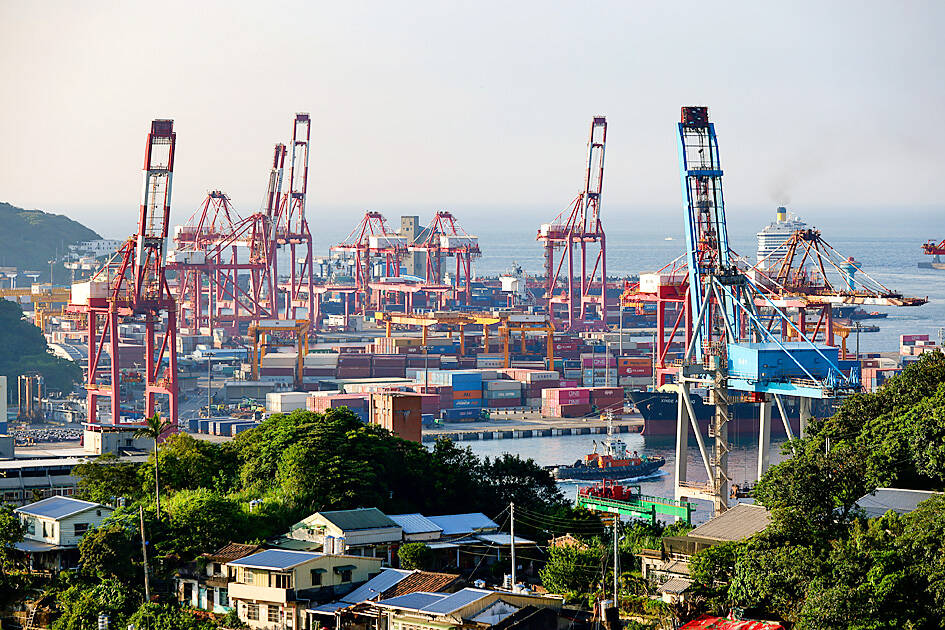Improving the competitive edge of Taiwanese exporters in the global market has offset the adverse impact of a stronger New Taiwan dollar against the US dollar, the central bank said in a report on Thursday.
Many Taiwanese firms, particularly in the semiconductor industry, have invested significantly in advanced processes to meet global demand for emerging technologies, making them more competitive, the central bank said.
Despite the NT dollar’s sharp appreciation last month, strong demand for artificial intelligence (AI) applications and rush orders from foreign buyers to avoid tariffs by US President Donald Trump’s administration pushed up exports by 32.3 percent.

Photo: Ritchie B. Tongo, EPA-EFE
This year, the NT dollar has risen against the US dollar by more than 11 percent. Last month, the local currency soared NT$2.088, or nearly 7 percent, against the greenback.
The central bank said it jumped into the market to shore up the US dollar and prevent the NT dollar from rising further, but denied the US had pressured Taiwan for a stronger local currency while Taipei and Washington were in talks about tariffs.
The appreciation of the NT dollar continued this month, as conflict in the Middle East escalates. Earlier last week, the local currency hit NT$29.460 at one point, the highest in more than three years.
A rising NT dollar cuts both ways: The appreciation is expected to result in foreign exchange losses for exporters, but it would lower costs for companies that need to buy equipment or raw materials overseas, the central bank said.
After a survey on how local enterprises reduce foreign exchange losses, the central bank found that many companies engaged in hedging practices, including “natural hedging.”
A common natural hedging method is to match revenues and expenses or invoices in the local currency, it said.
Many Taiwanese exporters have also adjusted their production and sales models, the central bank said.
In the short term, they raised product prices and cut orders on products with lower gross margins, but they are keen to increase value-added products and diversify their product portfolios in the long run, it said.
The central bank said it would continue its efforts to maintain order in the foreign exchange market and ensure that the NT dollar moves in a dynamic equilibrium.
Central bank Governor Yang Chin-long (楊金龍) on Thursday told reporters that the strength of the NT dollar this year remained acceptable, adding that with Taiwan’s economic growth expected to slow down and US tariff policies likely to become clearer in the second half of the year, the appreciation of the local currency could moderate accordingly.

Taiwan’s long-term economic competitiveness will hinge not only on national champions like Taiwan Semiconductor Manufacturing Co. (TSMC, 台積電) but also on the widespread adoption of artificial intelligence (AI) and other emerging technologies, a US-based scholar has said. At a lecture in Taipei on Tuesday, Jeffrey Ding, assistant professor of political science at the George Washington University and author of "Technology and the Rise of Great Powers," argued that historical experience shows that general-purpose technologies (GPTs) — such as electricity, computers and now AI — shape long-term economic advantages through their diffusion across the broader economy. "What really matters is not who pioneers

In a high-security Shenzhen laboratory, Chinese scientists have built what Washington has spent years trying to prevent: a prototype of a machine capable of producing the cutting-edge semiconductor chips that power artificial intelligence (AI), smartphones and weapons central to Western military dominance, Reuters has learned. Completed early this year and undergoing testing, the prototype fills nearly an entire factory floor. It was built by a team of former engineers from Dutch semiconductor giant ASML who reverse-engineered the company’s extreme ultraviolet lithography (EUV) machines, according to two people with knowledge of the project. EUV machines sit at the heart of a technological Cold

TAIWAN VALUE CHAIN: Foxtron is to fully own Luxgen following the transaction and it plans to launch a new electric model, the Foxtron Bria, in Taiwan next year Yulon Motor Co (裕隆汽車) yesterday said that its board of directors approved the disposal of its electric vehicle (EV) unit, Luxgen Motor Co (納智捷汽車), to Foxtron Vehicle Technologies Co (鴻華先進) for NT$787.6 million (US$24.98 million). Foxtron, a half-half joint venture between Yulon affiliate Hua-Chuang Automobile Information Technical Center Co (華創車電) and Hon Hai Precision Industry Co (鴻海精密), expects to wrap up the deal in the first quarter of next year. Foxtron would fully own Luxgen following the transaction, including five car distributing companies, outlets and all employees. The deal is subject to the approval of the Fair Trade Commission, Foxtron said. “Foxtron will be

INFLATION CONSIDERATION: The BOJ governor said that it would ‘keep making appropriate decisions’ and would adjust depending on the economy and prices The Bank of Japan (BOJ) yesterday raised its benchmark interest rate to the highest in 30 years and said more increases are in the pipeline if conditions allow, in a sign of growing conviction that it can attain the stable inflation target it has pursued for more than a decade. Bank of Japan Governor Kazuo Ueda’s policy board increased the rate by 0.2 percentage points to 0.75 percent, in a unanimous decision, the bank said in a statement. The central bank cited the rising likelihood of its economic outlook being realized. The rate change was expected by all 50 economists surveyed by Bloomberg. The